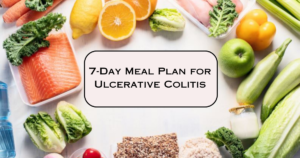What Is Ulcerative Colitis?
The inflammatory bowel disease known as ulcerative colitis impacts the colon, creating symptoms including abdominal pain, fatigue, diarrhea, and weight loss. Patients who have UC need to address their symptoms by taking medicine combined with appropriate food choices because the condition experiences intermittent flare-ups. People with ulcerative colitis experience better health outcomes when they follow diet plans made according to their disease needs, while inflammation reduces and flare-ups become less frequent.
The process of developing a personalized diet for ulcerative colitis becomes complex because both food sensitivity thresholds and activation agents exist in great diversity per individual. Accomplishing effective UC management depends on recognizing which foods calm down the digestive system and supply crucial nutrients. 7-Day Meal Plan for Ulcerative Colitis includes decreasing inflammation food choices alongside stomach-friendly and smooth-to-process ingredients.
Day 1: Gentle Start to the Week
Breakfast:
Oatmeal with Banana and Almond Butter
Consuming oatmeal together with mashed bananas and almond butter creates a soothing combination that brings gentle soluble fiber benefits for the intestines. The banana contains potassium to replace electrolytes, and almond butter provides nutritious fats for your body.
Lunch:
Grilled Chicken with Steamed Zucchini and Carrots
Consuming grilled chicken works well for individuals with sensitive stomachs. It is best to eat cooked zucchini alongside carrots, together with well-cooked vegetables, because this combination supplies dietary fiber that does not cause intestinal pain. The steaming process reduces vegetable firmness; therefore, you can more easily consume them.
Dinner:
Baked Salmon with Sweet Potatoes and Spinach
Salmon provides an excellent food choice for UC patients because the omega-3 fatty acids inside reduce inflammation in the body. The combination of baked sweet potatoes contains vitamins and complex carbs, and spinach offers dietary fiber and iron content. The thorough cooking process makes spinach simple to process during digestion.
Snacks:
Applesauce (unsweetened)
Unsweetened applesauce serves as a digestive snack because it provides a strong alternative to foods.
Day 2: Easy-to-Digest and Soothing
Breakfast:
Scrambled Eggs with Avocado
Breakfast with scrambled eggs provides soft, protein-rich food. The addition of an avocado half brings monounsaturated fats and extra fiber, as well as low gut-irritating properties from simple preparation methods.
Lunch:
Rice with Grilled Turkey and Cucumber
White rice represents a bland carbohydrate choice suitable for consuming during an active UC flare-up. Lean turkey protein combines well with white rice for a meal that also benefits from cucumber’s gentle digestion properties after removing its peel.
Dinner:
Chicken Soup with Carrots and Rice
A homemade chicken soup prepared with tenderness acts as a comforting and soothing remedy. The meal preparation includes small amounts of low-fat chicken broth combined with tender carrots and rice. Strengthen your diet by avoiding spicy as well as acidic seasonings that could lead to symptom activation.
Snacks:
Greek Yogurt (plain)
You get probiotics from Greek yogurt along with its high content of beneficial bacteria that assist both your digestive system and restore microbiome balance. The product must be tolerable by patients, but individuals with sensitive guts need to check for dairy reactions.
Day 3: Incorporating Probiotics
Breakfast:
Smoothie with Blueberries, Spinach, and Almond Milk
The blend of fresh spinach, blueberries, and almond milk makes a smoothie that contains both antioxidant properties and dietary fiber. Blend the spinach properly until it becomes smooth to make swallowing easier.
Lunch:
Turkey Meatballs with Mashed Potatoes
Lean turkey meatballs function as an excellent protein source in meals. Mashed potatoes make a suitable side dish when served with turkey meatballs because they are gentle on the digestive system. The near-finished but rich taste can come from olive oil instead of butter or cream.
Dinner:
Grilled Tilapia with Steamed Broccoli
Grilled tilapia works as a mild fish protein source because it is simple for digestion. The combination with steamed broccoli works well, although some people handle broccoli well while others generate gas from it, which requires complete cooking.
Snacks:
Cottage Cheese (low-fat)
The low-fat version of cottage cheese presents protein in a form that is simple to absorb. A small amount of peeled cucumber makes a nice complement to this light snack.
Day 4: Boosting Energy with Anti-Inflammatory Foods
Breakfast:
Chia Pudding with Strawberries
Chia seeds serve as a top source of omega-3 fatty acids that minimize inflammation in your body. Create an almond milk and chia seeds mixture and let the pudding rest overnight. The dish gets finished off with strawberries, which contain antioxidants along with vitamin C.
Lunch:
Quinoa Salad with Roasted Chicken and Carrots
The gluten-free grain quinoa places minimal strain on your stomach and provides high-protein benefits. A combination of chicken and carrots roasted together offers a satisfying yet easy-to-digest lunch meal.
Dinner:
Baked Cod with Mashed Sweet Potatoes
The protein content from medium-seared Cod remains suitable for patients with digestive challenges. The dish pairs wonderfully with mashed sweet potatoes that offer rich vitamins while presenting a great tolerance for digestion.
Snacks:
Banana with Peanut Butter
The combination of a banana with one spoonful of peanut butter makes a simple snack that contains essential potassium and beneficial healthy fats for nutrient restoration.
Day 5: Simple and Comforting Foods
Breakfast:
Rice Pudding with Almonds
The smooth, non-dairy rice pudding created with almond milk provides daily comfort through its first meal. Finish the dish with sliced almonds to enhance texture, along with beneficial fats.
Lunch:
Baked Chicken with Carrot and Zucchini Puree
The protein content in baked chicken pairs well with the blended and easy-to-process anti-inflammatory vegetables from carrots and zucchini. The process of creating vegetable purees improves their digestion for UC patients.
Dinner:
Vegetable Soup with Rice
A smooth vegetable soup containing rice, zucchini, and carrots represents an ideal patient-friendly meal that promotes gastrointestinal comfort. The use of spicy seasonings or high-fiber vegetables in your meal must be avoided to decrease irritation.
Snacks:
Rice Cakes with Almond Butter
The pairing of rice cakes with almond butter provides a meal that is easily digested because these foods combine lightness and healthy fat content and protein benefits.
Day 6: Focus on Hydration and Fiber Management
Breakfast:
Boiled Eggs with Toasted White Bread
Eggs boiled to perfection serve as a patient protein source because they match well with the stomach, and white bread gives the body a straightforward carbohydrate intake. The consumption of whole-grain bread should be avoided since it contains high levels of fiber, which may be difficult for UC patients to tolerate.
Lunch:
Grilled Fish with Mashed Potatoes
For a balanced and mild lunch, try grilled fish such as salmon or cod along with mashed potatoes.
Dinner:
The meal combines ground turkey with both steamed carrots and rice.
Turkey ground meat, together with properly cooked tender carrots and steamed rice, makes a nourishing dinner that your digestive system will find comfortable.
Snacks:
Applesauce (unsweetened)
You should proceed with applesauce because it represents a mild snack option suitable for sensitive digestion.
Day 7: Light and Nourishing
Breakfast:
Oatmeal with Blueberries
You should begin your morning with oatmeal, which you prepare using almond milk or plain water. The addition of fresh or frozen blueberries on top of the meal provides antioxidants to enhance its nutritional value.
Lunch:
Grilled Chicken and Mashed Sweet Potatoes
A healthy anti-inflammatory meal can be achieved by eating grilled chicken together with mashed sweet potatoes.
Dinner:
Baked Salmon with Steamed Asparagus
Salmon baked with steamed asparagus makes a healthy anti-inflammatory dinner that will not burden your digestive system.
Snacks:
Greek Yogurt with Honey
A tiny portion of plain Greek yogurt combined with honey serves as a probiotic source to enhance digestion, only if the stomach can accept this combination.
Final Thoughts on a 7-Day Meal Plan for Ulcerative Colitis
Each person facing ulcerative colitis must understand that their food tolerances might differ from the seven-day serving plan’s suggested foods. Every person dealing with ulcerative colitis should personalize the plan according to their specific needs and maintain ongoing records of foods that trigger symptoms.
Seek professional advice from health providers and registered dietitians before making dietary changes that affect ulcerative colitis patients, especially when dealing with chronic conditions. Food selection that promotes gut health will help you reduce the effects of UC symptoms on your regular activities.






